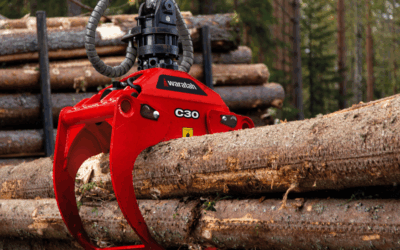ALC Meeting Touts Group’s Growing Impact
Article by Dan Shell, Managing Editor, Timber Harvesting November/December 2021
 COEUR d’ALENE, Id.
COEUR d’ALENE, Id.
Please read complete coverage on the 2021 ALC meeting beginning on page 14, but a few notes are in order here as the organization shifts gears with new leadership and an office presence in Washington, DC. The organization has truly come a long way. Though a bit sobered by the challenges that face the logging industry, those in attendance definitely enjoyed the first face-to-face fellowship, networking and information- sharing event in more than two years.
Special thanks go to the host group Associated Loggers-Idaho, Executive Director Shawn Keough and Idaho state group and national ALC President Tim Christopherson and everyone else involved for their hard work and hospitality in putting on a great event. The great fall weather can be a little harder to pull off but they definitely did. And Scott Dane, ALC executive vice president, put together a highly informative seminar and fun and significant banquet package.
Trucking Dominates
While the event covered a broad swath of concerns, issues surrounding trucking on all sides, from regulations and liability to driver shortages and trucking availability, pose some of the toughest challenges currently facing loggers. Trucking was never far from the surface on almost any topic, from a full day of TeamSafe Trucking presentations the day before the ALC meeting began to ALC seminar day presentations and also taking up time and debate during the general meeting. Several angles stood out:
Dash cams. Dash cams. Dash cams. Buy them. Install them. Run with them. Use them. Currently, for loggers, this is likely the single best relatively low cost trucking investment they can make to protect their businesses. Loggers, lawyers and even a cop talked about how useful and important they are. All that griping about wreck-chasing trial lawyers running up trucking costs? Loggers can cut out a whole bunch of that foolishness with camera systems that show events as they truly happened—not some emotional retelling that’s calculated to sway a judge or jury.
Is trucking logging? Do loggers need to worry with it? We know loggers are always worried about it because that’s the only way to get paid. We know relatively small loggers across the country who still run a low-boy and one or two rigs because they know they can put a truck on the landing any time, exactly when and where they want it. This goes for larger loggers who may be going with almost all contract haulers as well. Yet those two or three trucks opens a smaller logging company to the same headaches and challenges as one running 10-20 trucks—and those liabilities may be much more significant for a smaller outfit.
One company that’s seeing the logging industry’s challenges as an opportunity is JB Hunt out of Arkansas, which is making a concerted effort to provide capacity. We’ll cover that more in detail in a future issue, but during a presentation in Coeur d’Alene a company representative talked about its capabilities and what they can bring to the table.
With almost every truck-running logger out there struggling to fill seats, larger companies can bring more resources— and more drivers—to the table. As ALC board member Richard Schwab of MA Rigoni in Florida noted, “We have to look at things differently, and there are different ways to do what we’ve always done.”
The ALC’s Safe Routes Act may be on the fade. Promoting legislation that allows trucks to operate on the much safer interstate highway system as been a big ALC priority for several years, but that may be changing. Talks with transportation lobbyists have revealed the steep uphill climb such legislation has since it’s a blanket, nationwide policy.
Instead, look for state logging groups to pursue “carve-outs” of specific interstate routes and segments where log trucks are legal on a state-by-state basis. Some states have had success doing “carve-outs,” others, not so much. Look for ALC’s “Safe Routes” strategy to shift toward supporting such efforts.
Latest News
New From Waratah: Forestry Grapple Line
New From Waratah: Forestry Grapple LineWaratah Forestry Equipment has introduced its new line of forestry grapples, designed to deliver performance and reliability across a wide range of forestry...
New Hampshire Carbon Credit Impact Report
New Hampshire Carbon Credit Impact ReportA report on the impact of carbon credit programs in New Hampshire is due later this year, part of legislation the state passed in 2024 to gauge the effect of...
WANT MORE CONTENT?
Spanning seven decades since its inception in 1952, Timber Harvesting highlights innovative and successful logging operations across the U.S. and around the world. Timber Harvesting also emphasizes new technology and provides the best marketing vehicle for the industry’s suppliers to reach the largest number of loggers in North America and beyond.
Call Us: 800.669.5613

